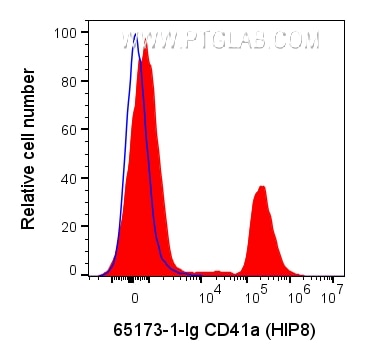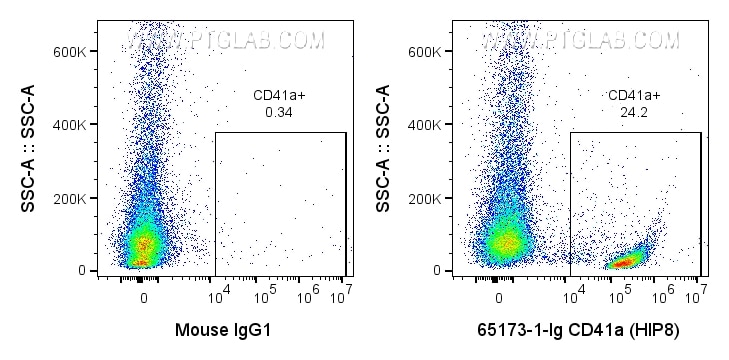Tested Applications
| Positive FC detected in | human peripheral blood |
Recommended dilution
| Application | Dilution |
|---|---|
| Flow Cytometry (FC) | FC : 0.2 ug per 10^6 cells in 100 μl suspension |
| This reagent has been tested for flow cytometric analysis. It is recommended that this reagent should be titrated in each testing system to obtain optimal results. | |
| Sample-dependent, Check data in validation data gallery. | |
Product Information
65173-1-Ig targets CD41 in FC applications and shows reactivity with human, non-human primates samples.
| Tested Reactivity | human, non-human primates |
| Host / Isotype | Mouse / IgG1, kappa |
| Class | Monoclonal |
| Type | Antibody |
| Immunogen | N/A Predict reactive species |
| Full Name | integrin, alpha 2b (platelet glycoprotein IIb of IIb/IIIa complex, antigen CD41) |
| GenBank Accession Number | BC117443 |
| Gene Symbol | CD41 |
| Gene ID (NCBI) | 3674 |
| RRID | AB_2881482 |
| Conjugate | Unconjugated |
| Form | Liquid |
| Purification Method | Affinity purification |
| UNIPROT ID | P08514 |
| Storage Buffer | PBS with 0.09% sodium azide, pH 7.3. |
| Storage Conditions | Store at 2-8°C. Stable for one year after shipment. |
Background Information
The integrins are a superfamily of cell adhesion receptors that bind to extracellular matrix ligands, cell-surface ligands, and soluble ligands (PMID: 17543136). They are transmembrane αβ heterodimers and at least 24 distinct integrin heterodimers are formed by the combination of 18 α and eight β known subunits (PMID: 17543136; 20029421). In addition to mediating cell adhesion, integrins also play important roles in modulating signal transduction pathways that control cellular responses including migration, proliferation, differentiation, and apoptosis (PMID: 19118207). Integrin alpha-IIb (ITGA2B, CD41) is expressed on platelets, megakaryocytes and some hematopoietic progenitor cells (PMID: 11934866). This protein undergoes post-translational cleavage to yield disulfide linked light beta (25 kDa) and heavy alpha (125 kDa) chains, which join with integrin beta3 (CD61) to form a receptor for fibronectin, fibrinogen, plasminogen, prothrombin, thrombospondin and vitronectin. CD41/CD61 is crucial for platelet aggregation through binding of soluble fibrinogen. The HIP8 clone antibody specifically binds to the alpha chain of CD41.
Protocols
| Product Specific Protocols | |
|---|---|
| FC protocol for CD41 antibody 65173-1-Ig | Download protocol |
| Standard Protocols | |
|---|---|
| Click here to view our Standard Protocols |





